Women’s World Cup 2023 x Technology & Sports Scientist Hannah Pitt
In modern football, success is no longer solely determined by the raw skills of the players on the field. Behind the scenes, a silent revolution has taken place, one that has brought the importance of sports science to the forefront.
With its ability to enhance team performance, sports science has become an indispensable tool for coaches and players. By harnessing the power of data and technology, teams can unlock hidden potentials, refine strategies, and optimize training methods.
As the FIFA Women’s World Cup approaches, this intersection of science and sport will take centre stage, with Catapult set to support a record number of teams participating in the tournament.
Throughout this blog, we will delve deeper into the world of sports science and technology in women’s football, exploring its importance in enhancing team performance. We will also examine Catapult’s role in supporting teams at the FIFA Women’s World Cup, and shed light on the invaluable contribution of sports scientist Hannah Pitt to the German National Team.
FIFA Women’s World Cup: What You Need to Know
The upcoming FIFA Women’s World Cup kicks off on 20th July and promises to be a celebration of talent, skill, and the relentless pursuit of victory.
Catapult will play a crucial role by providing real-time insights and valuable data, our technology aims to give these teams a competitive edge, enabling them to make informed decisions and fine-tune their strategies throughout the competition.
This World Cup promises to be a spectacle like no other, as 32 teams from around the globe compete for glory. The road to victory is not an easy one, and the role of sports scientists will become paramount in helping teams navigate the demanding competition.
Tournament favourites the United States are the most successful team in the history of the Women’s World Cup, with four victories. However, with the expanded number of teams and the ever-increasing level of competition, two-time champions Germany, as well as many other nations, enter the tournament with a strong desire and chance to win.
Good luck to all teams competing in the 2023 FIFA Women’s World Cup!
The Rise of Women’s World Cup Technology
Women’s football has witnessed a remarkable evolution in recent years, with technology playing an increasingly crucial role in the sport. International tournaments, such as the FIFA Women’s World Cup, have become platforms to showcase the growing significance of technological advancements.
Gone are the days when performance analysis was limited to subjective observations. Today, sports science and technology provide teams with a competitive edge.
At the forefront of this technological revolution stands Catapult. We have become an integral part of major tournaments like the FIFA Women’s World Cup as we will support an impressive 17 out of the 32 participating teams.
Competing teams will be able to take advantage of Catapult’s recently released women’s-specific vest. The vest features an optimized heart rate sensor and improved fit that caters specifically to the unique needs of female athletes. Former Canadian Women’s player Christina Julien tells more:
The elite vest optimises the intersection of sports science, technology, and women’s football, shaping a new era of the sport, where data-driven decision-making and cutting-edge innovations pave the way for success on the global stage.
Ahead of the Women’s World Cup, and in an attempt to dive deeper into the growth of technology in women’s football, we recently spoke with two Philippines National team players – Inna Palacios and Hali Long.
How Technology Helped Philippines National Team’s 2023 Women’s World Cup Qualification
This webinar interview was a unique opportunity for teams alike to learn how to build a winning strategy through teamwork and technology. Sign up for the Webinar here.
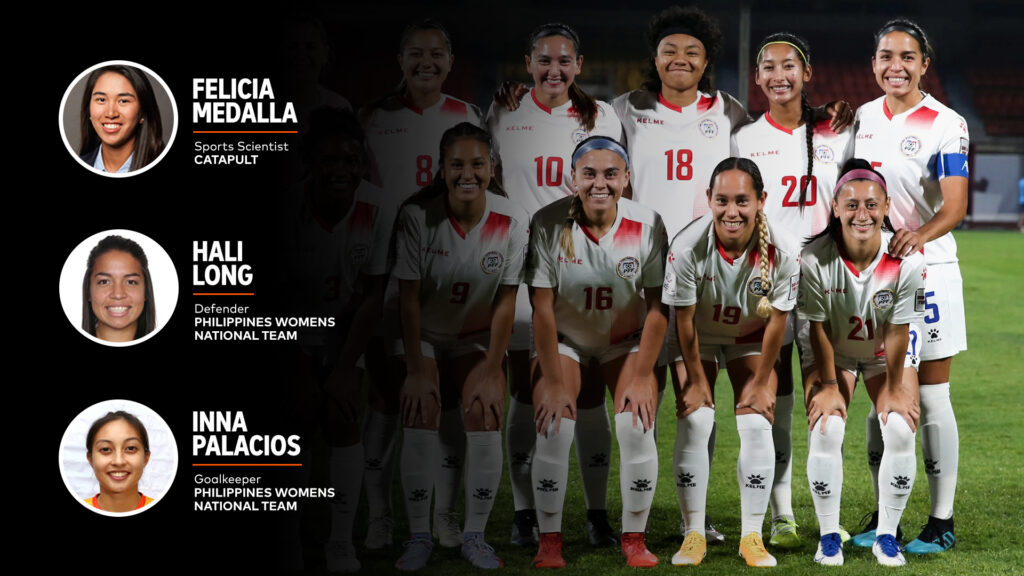
The Philippines National Team qualified for their first-ever World Cup and will compete starting in July. In this webinar, Catapult’s Customer Success Specialist, Felicia Medalla discusses with Philippines teammates Inna Palacios and Hali Long how they worked together to qualify for their first-ever World Cup.
In addition, they discuss how the team will be using technology to enhance their performance during the tournament in Australia and New Zealand. Sign up for the Webinar here.
Technology and Sports Science
Despite technological advancements, the role of sports scientists cannot be overstated. Sports scientists are the primary users of technology as they monitor player fitness levels, assess workload, and optimize training programs tailored to the unique needs of each athlete.
The demanding nature of a tournament, like the Women’s World Cup, requires meticulous preparation, and sports scientists play a vital role in ensuring that teams are physically and mentally ready for the challenge.
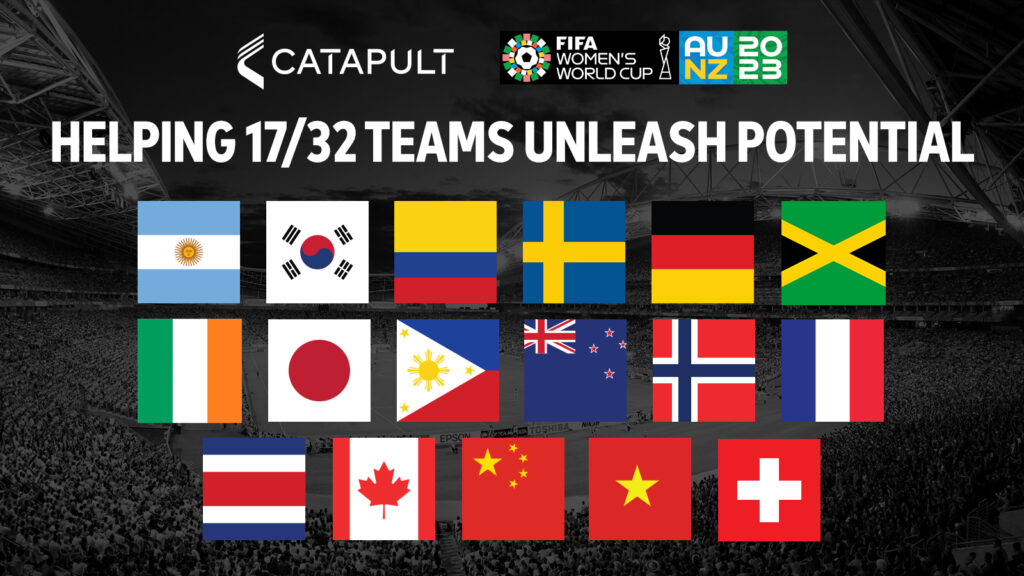
Through data-driven insights and evidence-based strategies, these professionals provide invaluable support to coaches and players. This helps them make informed decisions and maximize their potential on the grandest stage of women’s football.
As we approach the start of the FIFA Women’s World Cup, the blend of women’s football and advanced technology will continue to shape the sport’s landscape.
With the aspirations of teams like the United States, Canada, Sweden, England, and Germany set on triumph, the expertise of sports scientists will prove instrumental in guiding teams through the gruelling tournament, leveraging technology and science to achieve optimal performance and success.
Hannah Pitt: A Sports Scientist at the Forefront
At the forefront of the intersection between sports science and football stands Hannah Pitt, a distinguished practitioner and representative of Catapult.
With an impressive track record and a wealth of experience, Pitt has established herself as a key figure in the field, particularly in major tournaments. Her contributions have been invaluable in enhancing team performance and optimizing player potential.
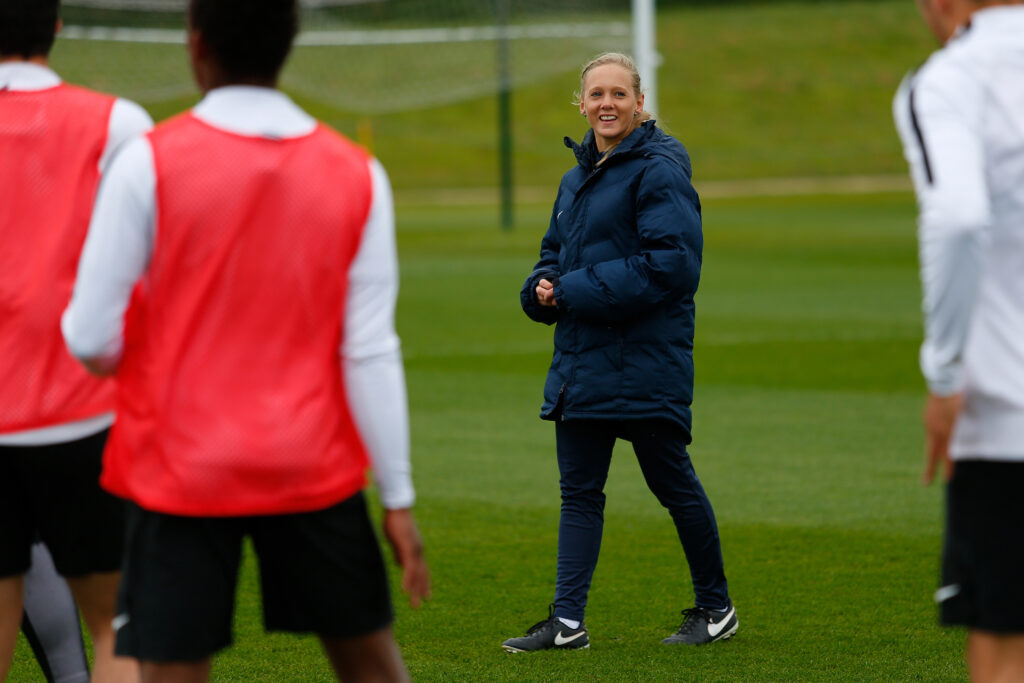
Pitt’s expertise in player monitoring, data analysis, and performance optimization has been honed through years of dedicated work with teams at the highest level of competition.
Notably, she played a pivotal role in the recent UEFA Women’s Euro 2020 Championships, where her scientific insights and meticulous attention to detail contributed to the success of the team she worked with.
Pitt’s ability to interpret and leverage data has been instrumental in devising training programs tailored to individual players’ needs, maximizing their performance and minimizing the risk of injuries.
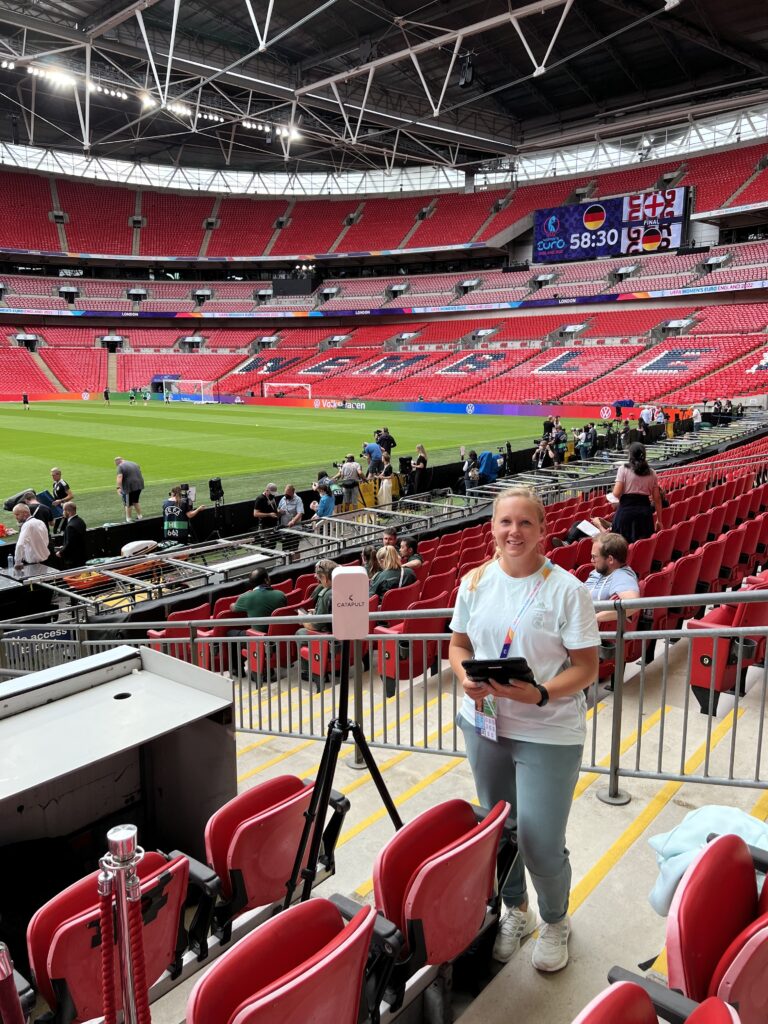
Women’s football possesses unique physiological and biomechanical characteristics that demand specialized approaches to training and monitoring. Pitt’s deep understanding of these factors enables her to tailor strategies that optimize performance for female athletes.
By staying at the forefront of sports science advancements and collaborating with Catapult’s innovative technologies, she continues to push the boundaries of what is possible in women’s football.
To learn more about Hannah Pitt and her contributions to the world of sports science, you can visit her LinkedIn page at Hannah Pitt. Her profile serves as a testament to her extensive knowledge, passion, and dedication, further highlighting the impact she has had on player development and performance optimization in the world of football.
Hannah Pitt x German National Team
As a sports scientist with Catapult, Pitt’s responsibilities span player monitoring, data analysis, and effective communication with the German coaching staff. Working closely with the players, Pitt utilizes Catapult’s advanced athlete monitoring solutions to collect real-time data on various performance metrics such as workload, heart rate, and physical exertion.
This wealth of information allows her to closely monitor player fitness levels, identify potential areas for improvement, and make data-driven recommendations for individualized training programs.
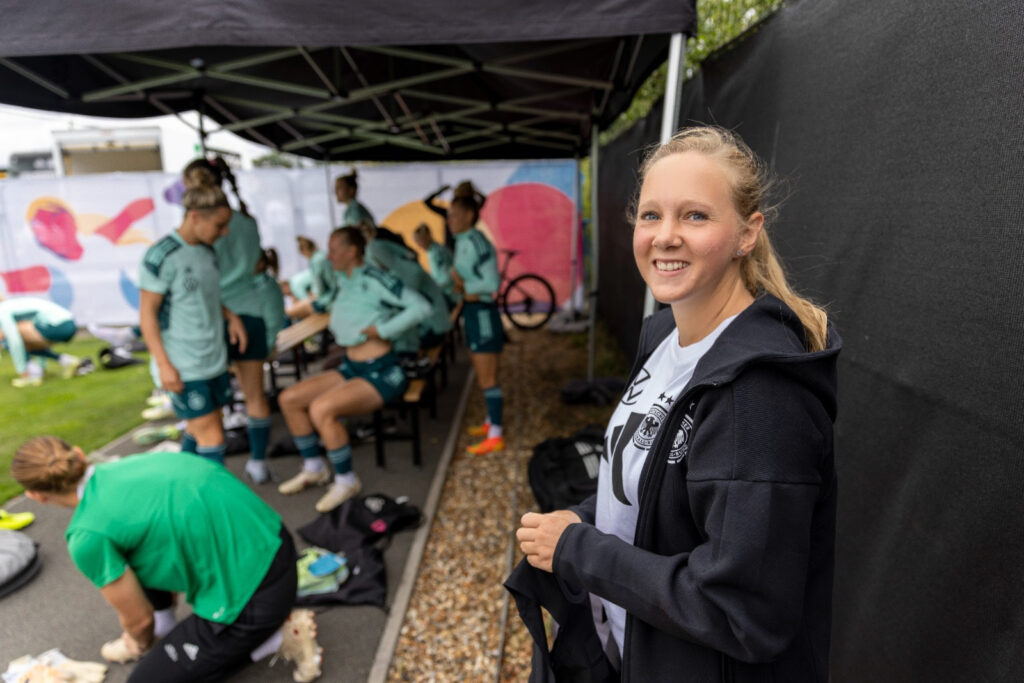
One of Pitt’s key responsibilities is the thorough analysis of the collected data. By delving deep into the numbers, she extracts valuable insights that can inform decision-making processes for the coaching staff. Pitt’s expertise in data analysis enables her to identify patterns, trends, and areas of improvement, empowering the team to optimize their training regimes and strategies.
Her ability to translate complex data into actionable recommendations ensures that the coaching staff can make informed decisions to maximize player performance and reduce the risk of injuries.
Throughout the upcoming FIFA Women’s World Cup, Pitt’s presence will be invaluable to the German National Team and she will be with them from June 20th through to August 25th.
With the tournament spanning several weeks of intense competition, Pitt’s continuous monitoring and analysis will be vital in managing player workload and ensuring optimal performance throughout the campaign. Her close collaboration with the coaching staff and players will foster a cohesive and integrated approach to player development, injury risk prevention, and overall team success.
Additionally, Pitt’s role extends beyond the technical aspects of sports science; she serves as a bridge between the data-driven insights and the coaching staff’s decision-making process. By effectively communicating the findings, recommendations, and strategies derived from the data analysis, she helps align the coaching staff’s vision with the players’ individual needs. This collaborative approach ensures that the entire team is working towards a common goal and maximizes the potential of each player on the field.
How are Technology and Sports Science applied before and during tournaments?
Pre-tournament
“Before a tournament, the preparation camps are meticulously planned and divided into microcycles, each with specific technical, tactical, and physical objectives. To ensure these objectives are met and to minimize the risk of injuries, technology plays a vital role during these camps. By utilizing various tools, we can monitor the players’ exposure to appropriate external loads, ensuring they are on track to achieve the desired performance outcomes,” said Pitt.
“One aspect of monitoring is the measurement of internal load, which refers to the physiological response of the players to the completed work. This is crucial in understanding how each player is responding to the prescribed loads and their potential for achieving the desired physiological adaptations … To capture this information, heart rate belts are employed, providing valuable data that helps gauge the players’ reactions.”
On a daily basis, the collected data is relayed to the athletic coach, who collaborates with the other coaches to assess the players’ progress. Based on this information, adjustments can be made to the following day’s training plan if necessary.
By continuously monitoring the external and internal loads during training sessions, any modifications can be implemented promptly to optimize the players’ performance. A particularly valuable metric in this process is athlete thresholds, which assist in determining appropriate training intensities and volumes.
Furthermore, “it is crucial to gather insights into the players’ recent internal and external loads prior to the commencement of the preparation camps. This information helps establish a baseline understanding of each player’s physical condition. To achieve this, communication with the players’ domestic clubs is essential, as it allows us to access data on their recent training and match exposures,” explained Pitt.
Combining the use of technology, constant monitoring, and effective communication with domestic clubs, Pitt can ensure that players are adequately prepared before a tournament: “This comprehensive approach enables us to optimize their performance, minimize the risk of injuries, and adapt training plans according to individual needs.”
During tournament
The high demands of competitive match-play necessitate carefully considering individual player preparation strategies. Technology plays a crucial role in ensuring that players are appropriately tapered into matches and that their external and internal demands are comprehensively understood. “This understanding allows for the implementation of suitable recovery and top-up strategies to optimise performance ahead of the next match,” said Pitt.
To gain insights into the players’ physical exertion and physiological responses during matches, athlete monitoring technology is worn by the players. This technology captures valuable data on the external and internal demands placed on the players during gameplay.
By analyzing this data, coaches can make informed decisions regarding recovery protocols and strategies to replenish the players’ energy stores, enabling them to perform at their best in subsequent matches.
“The athlete monitoring data collected during matches is also integrated with the technical and tactical data in tools like MatchTracker and Focus … The aim here is to gain a deeper understanding of the contextual factors associated with the physical loads experienced by the players during specific tactical outputs in a match. This integration provides valuable insights into the relationship between the players’ physical exertion and their strategic decisions on the field,” said Pitt.

Pitt continues: “In particular, Focus allows us to examine the physical demands placed on the players during specific periods of a match. By analyzing the data, coaches can identify patterns and trends related to physical performance throughout the game, enabling them to make informed decisions about player substitutions, tactical adjustments, and individual player workload management.
“Similar to the preparation camps, the data collected during tournaments is monitored in real-time and relayed to the athletic coach. This feedback loop ensures that the coaching staff remains up to date with the players’ physical status and allows them to make informed decisions regarding training, recovery, and match strategies.”
By leveraging technology, monitoring live data, and integrating various sources of information, coaches can optimize the preparation and performance of individual players during tournaments.
This holistic approach to player management enables the coaching staff to fine-tune strategies, maximize recovery, and ensure that players can perform at their peak throughout the demanding tournament schedule.
Catapult working close with the German National Team
Catapult’s work with the German National Team has been instrumental in revolutionizing its approach to performance optimization and injury prevention. This collaboration builds upon Catapult’s existing strong presence in German football, including its successful partnership with many Bundesliga teams.

–> Learn more about Catapult’s work in Germany.
With Catapult’s advanced athlete monitoring solutions, the German National Team gains access to a comprehensive suite of tools that provide invaluable insights into player performance and workload management.
Catapult’s technology offers real-time feedback on key metrics such as distance covered, acceleration, deceleration, and heart rate, enabling the coaching staff to make data-driven decisions to optimize training and game strategies. This level of detail and precision allows for a tailored approach that maximizes player potential while minimizing the risk of injuries.
Working collaboratively closely with Catapult’s solutions has proven particularly beneficial in the area of load management. Now, the German National Team can closely monitor player workloads and ensure that they are operating within optimal levels.
This data-driven approach enables the coaching staff to make informed decisions regarding training intensity and recovery protocols, reducing the risk of overexertion and fatigue-related injuries. The ability to precisely monitor and manage player loads has become increasingly critical, especially in high-intensity tournaments such as the FIFA Women’s World Cup.
Summary: Women’s World Cup x Sports Scientist Hannah Pitt
This blog has shed light on the pivotal role of sports science and technology in women’s football, particularly in the context of the upcoming FIFA Women’s World Cup.
The evolution of technology has brought about significant advancements in player performance analysis and monitoring, enabling teams to maximize their potential on the field.
Catapult, as a leading sports technology company, has become an integral part of major tournaments like the Women’s World Cup, supporting a substantial number of teams in their pursuit of success.
Throughout the Women’s World Cup, Sports Scientist, Hannah Pitt will play a crucial role in supporting the German national team. Her expertise in player monitoring, data analysis, and performance optimization will be invaluable in helping the team navigate the challenges of the tournament.
As women’s football continues to gain prominence, the integration of sports science and technology becomes increasingly critical. The advancements in athlete monitoring, data analysis, and performance optimization have transformed the landscape of the sport.